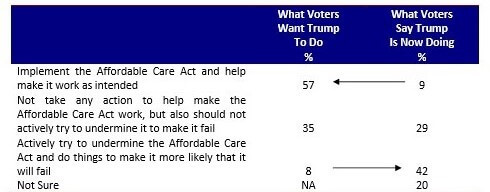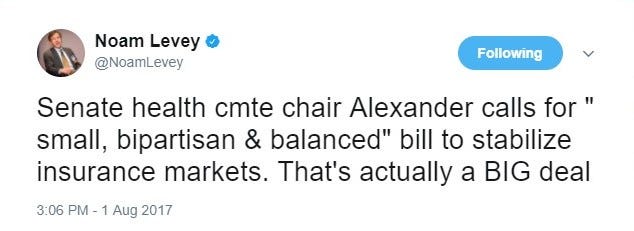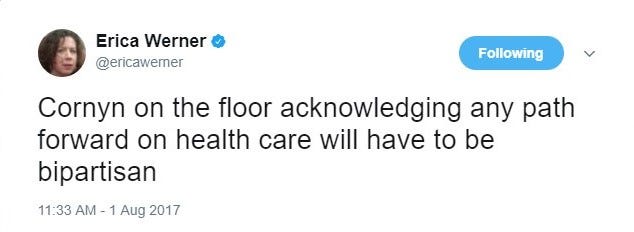To: Interested Parties
From: Leslie Dach, Protect Our Care Campaign Director
Re: Health Care Debate: A Sea Change
Date: August 4, 2017
This past week represented a sea change in the effort to repeal health care that few would have predicted when President Trump and Republicans launched their partisan repeal campaign in January. While most observers believed Trump and Republicans in Congress would muscle through legislation to repeal Obamacare by hook or by crook, in the relative blink of an eye, repeal has been declared all but dead, Trump has become increasingly isolated on the issue and the grassroots energy to protect and improve the law has continued unabated.
Here are three things you need to know about the state of the Republican repeal attempts in Washington:
First, Congress’s push to repeal health care is on life support, if not completely dead, with more members urging bipartisan cooperation. The momentum in Congress continued to shift away from repeal this week, with Republicans in both the House and Senate signaling that they favor a bipartisan process to improve our health care system going forward. Senators Lamar Alexander (R-Tenn.) and Patty Murray (D-Wash.) announced they are holding a series of bipartisan hearings in September to strengthen and stabilize the individual market.
Senate Majority Whip John Cornyn (R-TX): “And I Think, Frankly, Bipartisan Solutions Tend To Be More Durable.” “‘There’s a lot the American people expect of us, but we’ve seen with fragile majorities in the Senate that we are forced to work together to try to solve these problems. And I think, frankly, bipartisan solutions tend to be more durable,’ Cornyn said. Democrats have sent Republicans multiple letters on healthcare that asked, for example, for an all-Senate meeting and suggested a list of rooms where they could hold a public hearing.” [The Hill, 8/1/17]
Senate HELP Committee Chair Lamar Alexander (R-TN): “This Committee Will Hold Hearings…On The Actions Congress Should Take To Stabilize And Strengthen The Individual Health Insurance Market.” “This committee will hold hearings beginning the week of September 4th on the actions Congress should take to stabilize and strengthen the individual health insurance market so that Americans will be able to buy insurance at affordable prices in the year 2018. We will hear from state insurance commissioners, patients, Governors, health care experts and insurance companies. Committee staff will begin this week working with all of our committee members to prepare for these hearings and discussions.” [Alexander and Murray Statement, 8/1/17]
Senate Finance Committee Chair Orrin Hatch (R-UT) On Moving Forward On Health Care: “I Hope It’ll Be Bipartisan.” [Politico, 7/31/17]
The American people reject Republican partisan repeal and want Congress to work in a bipartisan way, and they are holding Republicans accountable for their votes.
Quinnipiac Poll: “Voters Disapprove 5–1 Of GOP Handling Of Health Care.” “American voters disapprove 80–15 percent of the way Republicans in Congress are handling health care. Even Republicans disapprove 60–32 percent. Voters disapprove 64–25 percent of Republican ideas to replace Obamacare.” [Quinnipiac Poll, 8/3/17]
And in states around the country, people held rallies, called their members of Congress, and showed they will not stop until Congressional Republicans, President Trump and HHS Secretary Tom Price quit their game of repeal and sabotage.
Second, President Trump and his administration are increasingly isolated on an island of their own making. Trump and HHS Secretary Tom Price continue to advocate for legislative repeal when Republicans in Congress have made clear they want to move on. Absent Congressional action, the administration continues to sabotage the marketplaces, threatening to torpedo the insurance markets by defaulting on cost-sharing reduction payments that lower out-of-pocket costs and deductibles for a majority of those enrolled on the marketplaces. Republicans in Congress strongly disagree and have directly said the administration should continue funding the payments.
Senate Majority Leader Mitch McConnell (R-KY): “Some Kind Of Action With Regard To The Private Health Insurance Market Must Occur. No Action Is Not An Alternative.” “‘If my side is unable to agree on an adequate replacement, then some kind of action with regard to the private health insurance market must occur,’ McConnell said. ‘No action is not an alternative. We’ve got the insurance markets imploding all over the country, including in this state.’” [Washington Post, 7/6/17]
Senate HELP Committee Chair Lamar Alexander (R-TN): “Without Payment Of These Cost-Sharing Reductions, Americans Will Be Hurt.” “And Tennessee Senator Lamar Alexander, a Republican who chairs the influential health committee, said this week that he urged the president to make the payments through September so Congress could work on stabilizing Obamacare in the short-term. That bipartisan solution ideally should also include funding for the subsidies through 2018, he said. ‘Without payment of these cost-sharing reductions, Americans will be hurt,’ Alexander said.” [CNN, 8/4/17]
Senate Finance Committee Chair Orrin Hatch (R-UT): “I Think We’re Going To Have To Do That.” “President Donald Trump has been urging lawmakers not to drop the matter, despite a series of failed votes last week. ‘There’s just too much animosity and we’re too divided on healthcare,’ Hatch said in an interview with Reuters. He said he would prefer Congress not appropriate cost-sharing subsidies that help make Obamacare plans affordable but added, ‘I think we’re going to have to do that.’” [Reuters, 7/31/17]
Sen. Ron Johnson (R-WI): The Senate Should “Bite The Bullet And Stabilize Those Markets.” “Sen. Ron Johnson (R-Wis.) has for months called for a bipartisan stabilization bill that would guarantee funding for ObamaCare payments, known as cost-sharing reductions, to insurers. Those payments are key to avoiding premium spikes and keeping insurers in the markets. Johnson said Tuesday that he hopes the GOP can pass something next week, but if not, ‘bite the bullet and stabilize those markets.’” [The Hill, 7/13/17]
House Ways And Means Chair Kevin Brady (R-TX): “Simply Letting Obamacare Collapse Will Cause Even More Pain For [People].” [Brady Statement, 7/28/17]
House Energy And Commerce Committee Chair Greg Walden (R-OR): “I Will Do Everything I Can To Make Sure That The Cost-Sharing Reduction Payments Get Made.” “Likewise, Mr. Walden said last month, ‘I will do everything I can to make sure that the cost-sharing reduction payments get made.’ That, he said, is ‘an obligation we have not only to the insurers,’ but also to consumers, and ‘we cannot leave them high and dry.’” [New York Times, 4/10/17]
House Appropriations Health Subcommittee Chair Tom Cole (R-OK) On Making CSR Payment: “My Personal Opinion Is Yes.” ‘’I don’t think anybody wants to disrupt the markets more than they already are,’ Mr. Cole said in an interview. ‘It’s a very unstable market.’ Asked if he thought Congress should provide the money, Mr. Cole said, ‘My personal opinion is yes.’” [New York Times, 4/10/17]
Rep. Charlie Dent (R-PA) On Not Paying CSR: “I Think That Would Be A Mistake.” “First, withholding that money would ultimately hurt a lot of people making between 150, 200 percent of the poverty level trying to afford insurance. So, I think that would be a mistake.” [Dent Interview on CNN’s New Day, 7/31/17]
Republican and Democratic governors, the chief executives of their respective states, do not agree with the Trump/Price approach:
National Governors Association: “The Administration Has The Opportunity To Stabilize The Health Insurance Market Across Our Nation And Ensure That Our Residents Can Continue To Access Affordable Health Care Coverage.” “The Administration has the opportunity to stabilize the health insurance market across our nation and ensure that our residents can continue to access affordable health care coverage. A first critical step in stabilizing the individual health insurance marketplaces is to fully fund CSRs for the remainder of calendar year 2017 through 2018. This is a necessary step to stabilize the individual marketplaces in the short term as Congress and the Administration address long-term reform efforts.” [NGA, 8/2/17]
And political analysts and journalists have noted Trump’s self-created isolation, too.
New York Times: “‘Time to Move On’: Senate G.O.P. Flouts Trump After Health Care Defeat” [New York Times, 8/1/17]
Associated Press: “Senate Republicans Slowly Turning Their Backs On Trump” [Associated Press, 8/2/17]
Wall Street Journal: “Senate Republicans Rebuff Donald Trump’s Health-Care Push” [Wall Street Journal, 8/1/17]
The HIll: Senate Republicans Brush Off Trump’s Healthcare Demands [The Hill, 8/1/17]
Politico: “Republicans Ignore Trump’s Obamacare Taunts” [Politico, 7/31/17]
It’s clear that Trump and the administration will need to stop burning political capital on a failed gambit that will harm millions of Americans and that the legislative branch won’t get on board with.
Lastly, Americans who stood up and stopped repeal from happening aren’t letting up. Angry at the legislative failure to repeal the ACA, Trump and Price could respond by continuing their ongoing sabotage of people’s health care. They’ve threatened to default on paying cost-sharing reductions, which would raise premiums, spook insurers and hit the middle class hard. They might continue illegally using taxpayer funds to undermine the law. They could further curtail outreach and advertising efforts before Open Enrollment for HealthCare.gov, or continue producing misleading analysis of the ACA, or employ other sinister tactics to weaken current law and put people’s health care at risk.
But people are wise to what Trump and Price are trying to do.
This August recess, thousands of Americans will continue to make their voices heard.
They’ll attend local events across the country as part of Save My Care’s nationwide bus tour.
Los Angeles Times: “Protesters In L.A. And Across The Country Rally To Protect Healthcare From Future Threats.” [LA Times, 7/29/17]
Phoenix Fox 10: “‘Our Lives On The Line’ Rally In Phoenix Supports Affordable Health Care.” [Phoenix Fox 10, 7/29/17]
The Guardian: “Activists Refuse To Slow Resistance After Stymying Republican Healthcare Plan.” [The Guardian, 7/29/17]
They’ll canvass their neighborhoods, making sure their neighbors know how their Senators voted. They’ll continue to visit Congressional town halls across the country, asking their elected leaders to work on bipartisan ways to improve, not tear down, our health care system.
The sea change over the last seven days in how Republicans are approaching health care is significant. Let’s hope when they return from recess, they’ll be guided by the wishes of voters who depend on our health care system, not by the wishes of an increasingly isolated President who’s made clear he has little understanding of health care and equally little desire to remedy that.




